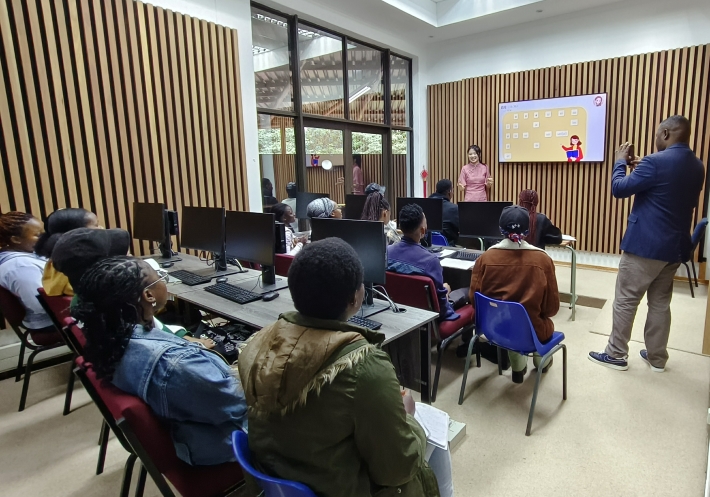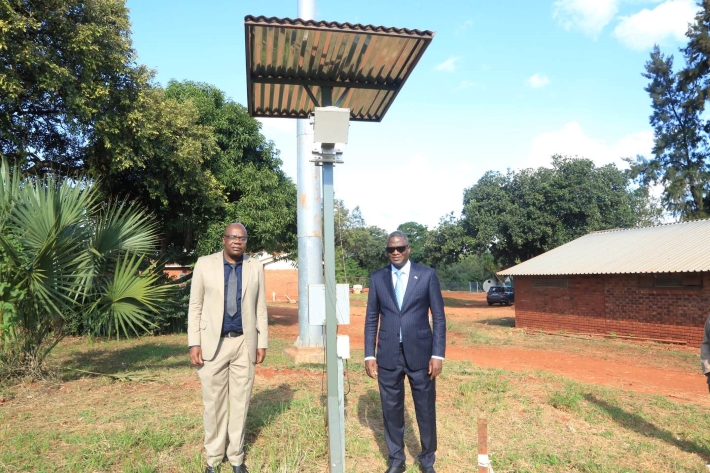|
||||||||||
| Home Top News Economy/Tech Culture/Sports China in Foreign Eyes Green Development Videos Intangible Cultural Heritages |
|
||||||||||
| Home Top News Economy/Tech Culture/Sports China in Foreign Eyes Green Development Videos Intangible Cultural Heritages |
| ChinAfrica |
| Cultivating a Green Future |
| Green Technology Confucius Institute enhances tech cooperation and exchanges between China and South Africa |
| By Ni Yanshuo | VOL. 17 May 2025 ·2025-05-08 |

A Chinese teacher gives a lesson on Chinese culture at UNIVEN Green Technology Confucius Institute in April 2024 (COURTESY)
Nhokwara Blessing calls herself a blessed girl. The 19-year-old Zimbabwean is studying Chinese language and Chinese culture in her university. She was born and brought up in Thohoyandou in Limpopo Province in the northern part of South Africa, bordering Zimbabwe. After graduation from a local high school, she chose to study in the University of Venda (UNIVEN) in 2024 as an international student. There, she was delighted to find a Confucius Institute.
She submitted an application on 5 March 2024 to study in the institute, along with more than 3,000 other applicants. But as the institute has four Chinese teachers from China, only 300 students could be admitted. Luckily, Blessing was one of the 300 students accepted. Her teacher gave her a Chinese name - Peng Zhufu - which literally means blessing.
“I am blessed because I can achieve my goals here. I hope to study Chinese language well,” said Blessing. “China has advanced technology. Learning Chinese can give me more opportunities after graduation as there are many Chinese enterprises here in South Africa and in my home country Zimbabwe.”
The Green Technology Confucius Institute (GTCI), which Blessing is attending, was co-established by UNIVEN and the Hubei University of Technology in central China’s Hubei Province on 5 December 2023, and started enrolling students in February 2024.
“In the GTCI, we not only teach Chinese language to students, but also provide a platform for them to learn more about Chinese culture. I can see the great enthusiasm of these students for learning about Chinese culture,” Grace Ge Ruihong, co-director of the GTCI, told ChinAfrica.
The GTCI complex, located at the main gate of UNIVEN, is designed in Chinese style, and is decorated with Chinese elements including calligraphy works, paintings, and sculptures.
In addition to regular lessons for students in UNIVEN, the GTCI also provides Chinese language trainings for nearby communities, like UNIVEN Experimental Kindergarten, Marude Secondary School and police stations in north Limpopo.
Promoting precision agriculture
According to Ge, the GTCI is the only Confucius Institute focusing on “green technology” among more than 500 Confucius Institutes worldwide. “We will design more ‘Chinese + green technology’ projects in light of local demand, so as to provide support to China-South Africa cooperation in green development,” she added.
One such project - China-Africa Joint Laboratory on BeiDou Navigation Satellite System and Remote Sensing Applications, co-established by UNIVEN and Beijing Beihang University on UNIVEN campus - was unveiled in September 2024. One month later, the first BeiDou system data receiver was installed on the experimental farm of UNIVEN.
Limpopo is the main crop production area in South Africa. However, traditional intensive farming methods, low level of mechanisation and climate change have led to a drop in productivity. By using the BeiDou satellite system, deploying intelligent terminals and receiving technological training, local farmers are beginning to solve these challenges. Currently, BeiDou system is being used on the UNIVEN farm for precise farming.
“By using the data receiver on the farm, we can use BeiDou navigation satellites to collect data, which will allow us to detect and monitor soil moisture levels. Additionally, there is potential to expand our capabilities to gather more data on livestock and to track the growth of crops in hydroponic tunnels and the fields,” Thifheli Gloria Kutama, experimental farm manager at the Faculty of Science Engineering and Agriculture of UNIVEN, told ChinAfrica. She called the system Digital and Precision Agriculture Crop Management.

Bernard Nthambeleni (right), vice chancellor and principal of UNIVEN, and James Chakwizira, professor of urban and regional planning at UNIVEN, inspect the BeiDou data receiver in UNIVEN on 31 March (WANG YUCHEN)
BeiDou for better farming
The device can help farmers to determine when crops need water, fertiliser, and pesticide. Additionally, remote sensing technology can offer valuable insights into crop performance, nutrient levels, and plant health. This approach aims to reduce waste, increase yields, and protect the environment by minimising chemical usage.
In addition, Kutama and her team also compare crop yields between hydroponic tunnels and traditional farming methods, so as to identify potential challenges associated with implementing precision agriculture in hydroponic systems. “The technology will measure several key parameters: soil moisture, soil temperature, air temperature, and air moisture, all of which play a significant role in influencing crop yield,” she said.
This system can also be used for animal management. Sensors on the animals can offer valuable insights into livestock growth, health, and behaviour, ultimately improving efficiency and production. It will become easier to monitor each animal’s movements, weight, and feed intake.
Based on the experience of managing the experimental farm, Kutama also held several training classes on digital farming for local farmers. Each class was attended by about 400 local farmers.
Supporting railway transportation
BeiDou system can be used in sectors more than farming, including rail transportation. According to Wang Yuchen from UNIVEN Principal’s Office, BeiDou system can enhance the safety and speed of high-speed trains.
Wang is promoting the use of BeiDou system in the planned Gauteng-Limpopo Rail Link Project. The 420-km route will run from South African capital Pretoria to Musina near South Africa-Zimbabwe border, creating a transport corridor to Zimbabwe.
In China, BeiDou system has been widely used to ensure safe operation of high-speed trains.
“If this system can be used in the trains in South Africa, it will greatly upgrade the railway operation in the country. BeiDou system can be applied in many areas in South Africa and will be a great platform for China-South Africa cooperation in high technology,” said Wang.
| About Us | Contact Us | Advertise with Us | Subscribe |
| Copyright Beijing Review All rights reserved 京ICP备08005356号-5 京公网安备110102005860号 |